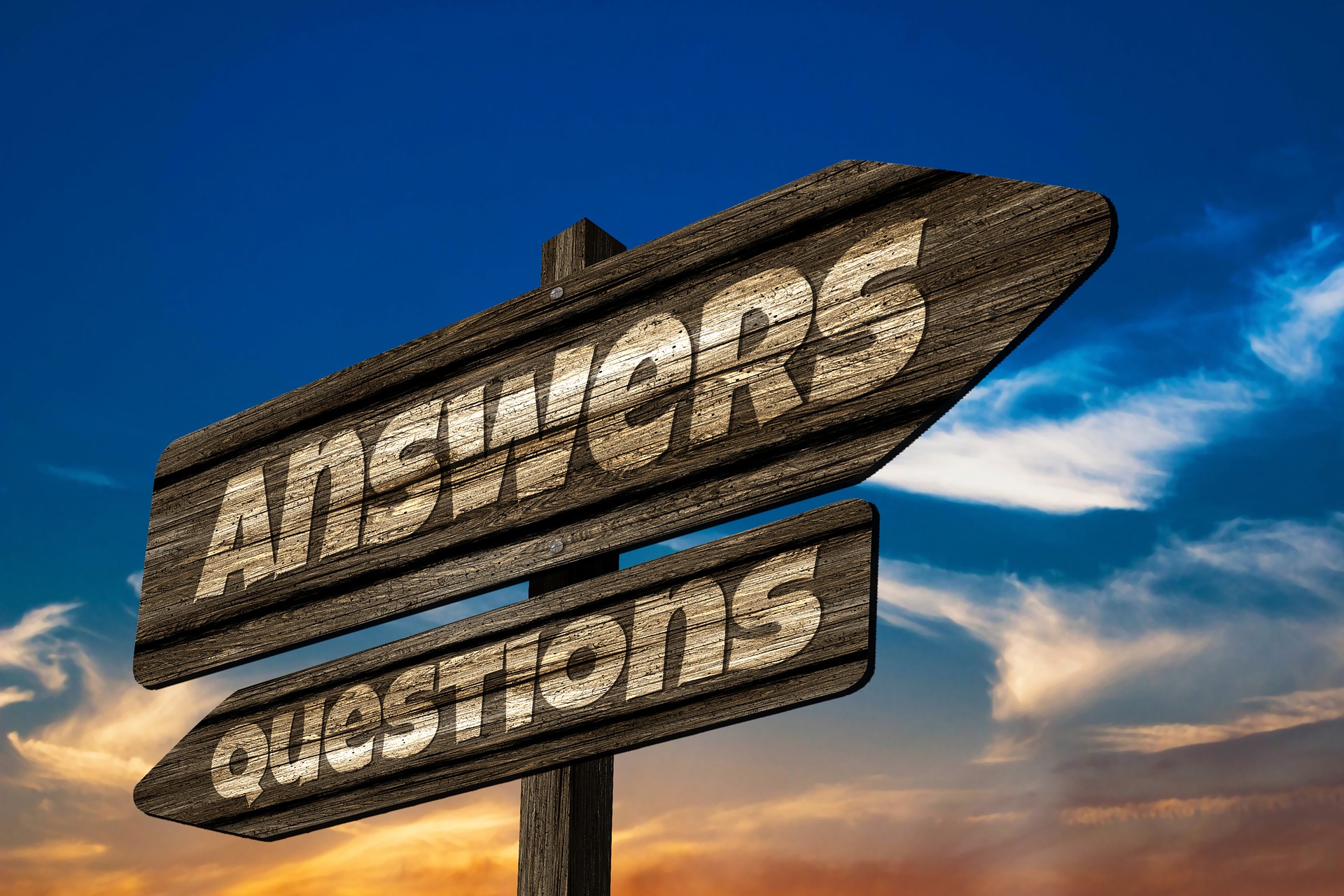How to answer most common questions in English requires essential skills. Anyone first needs to master basic questions for simple situations when learning a new language.
To help out with this quest, we’ve selected the 50 most common questions in English, and how to answer them.
Greetings and Introductions
Greetings and introductions are the start of any conversation, which is
1. How are you?
This is the first greeting question you can ask, in order to find out about the other person or people’s days. Here is a sample conversation:
- How are you today?
- I’m fine thanks! How are you doing?
- There are several more informal ways to ask How are you? You can see them below:
2. How’s it going?
If someone asks you, “How’s it going?” Your answer can be very short: Fine. Technically, “going good” is incorrect grammar; you should use “going well”. The “proper” answer is Fine. or Just fine, thank you. The question is almost the same as how do you do which is a way of a greeting and doesn’t really want an honest answer, especially if things are not going well. At most you might reply “Great!” if it’s true, “Pretty good” if not quite great but good.
3. What’s up?
The phrase is supposedly derived from “What’s the update?” which is basically checking up how things are going. It has however fallen into common usage both in the US (I think) and the UK as a short means of greeting of keeping up to date.
As a greeting:
“What’s up?” or here (West Midlands of England) commonly just “sup” is a general greeting, you can respond with answers like “Not much”, “Nothing”, “Alright” etc.
In this context, the response is just a return of the greeting or confirmation that all is going normally. This phrase is similar to “Hello” or “How are you” in common usage.
Personal Information Questions
Getting to know the people you’re talking with is important. The easiest way to get to know someone is to ask them. Here are some important questions you need to know, in order to get to know someone personally:
4. What is your name?
This is the question you need to ask if you want to know someone’s name. Here is a sample conversation:
- Hello, what’s your name?
- Hello, I’m Mike. What is your name?
- I’m Jake.
5. How old are you?
Asking to know someone’s age is another important part of making conversation with a person you don’t know. Here is a sample conversation:
- Hey, how old are you?
- I’m 23. What about you?
- Oh, I’m 25.
6. Where are you from?
When meeting new people who speak different languages it is interesting to find out more about the nationality and home country of these people. Here is a sample conversation:
- Hello, nice to meet you! Where are you from?
- Hey, I come from England. Where are you from?
- I’m from Romania.
7. Where do you live?
Another personal information question you can ask during a conversation is where do you live? Here is a sample conversation:
- Hey, where do you live currently?
- Oh, I live in a small flat in London.
8. What is your phone number/email?
Asking about a person’s telephone or email is a great way to stay in touch, and to continue talking after meeting for the first time. Here is a sample conversation:
- Hey, what’s your phone number?
- It’s 0845738787. Do you have an email address?
- Yeah, here it is.
9. Are you married?
One of the topics usually covered once you’ve talked to someone for a while is marital status. Here is a sample conversation:
- Hey, are you married?
- Yes, my wife is called Mindy, and we’ve been together for 12 years. How about you?
- No, I’m not married.
10. Do you have children?
On the topic of marital status, the next big question is if your conversation partner has children. Here is a sample conversation:
- So, do you and your wife have children?
- Yes, we have two daughters, Alice and Emily.
11. What do you do for a living?
This is one way of asking what someone’s professional occupation is. Here is a sample conversation:
- Hey, what do you do for a living?
- I am a graphic designer.
12. What is your job?
This is the most straightforward way to ask someone what they do for a living. Here is a sample conversation:
- Hey, what is your job?
- I am a graphic designer.
13. What are your hobbies?
Talking about your interests is one of the more fruitful topics you can cover. Here is a sample conversation:
- Hey, what are your hobbies?
- I like hiking and traveling.
14. What are your career goals?
Asking about someone’s professional aspirations is a good way to get to know them. Here is a sample conversation:
- You said you like your job, but what are your career goals?
- I would like to become a manager one day.
General Questions
Being able to have a conversation or even just a friendly banter means you need to know how to ask general questions. Below you will see some examples.
15. How have you been?
Asking someone about their general state of mind over the past few days, weeks or months is always a good conversation starter. Here is an example:
- Hey, how have you been the past couple of weeks?
- I’m doing good. I just got promoted.
16. Where were you?
If you want to know where someone went, this is the question to ask. Here is a sample conversation:
- Hey, where were you last night?
- Oh, I went to a bar with some of my colleagues.
17. What did you do?
If you want to know what someone did over the weekend, or during their holiday this is the right question. Here is a sample conversation:
- What did you do last weekend?
- My family and I went skiing.
18. Do you have a car/bike?
Transportation is an important part of everyday life and a good conversation topic. Here is a sample conversation:
- Hey, do you have a car?
- No, I use my bike to go around the city.
19. Do you have a pet?
Pets are an amazing conversation topic, as they usually bring up fond memories. Here is a sample conversation:
- Hey, do you have a cat or a dog?
- No, I actually have two parrots.
20. Do you speak another language?
In an environment where everyone is speaking in English, it is always interesting to know if people know other languages. Here is a sample conversation:
- Hey, do you speak another language besides English?
- Yes, I know Spanish and a little bit of Italian.
Shopping Questions
Being able to ask and answer questions while at the shop is one of the essential skills one has to master when studying a new question. Below you’ll see examples of the most common questions you can ask, or be asked while shopping.
21. How much does this cost?
This is the most important question in a shop setting. Wondering about the price of an item is one of the most common situations you end up in while shopping. Here is a sample conversation:
- Hello, how much does an ice cream cost?
- Hello, a small cup costs two dollars.
- Thank you!
22. Can I try this on?
When shopping for clothes it is important to know if you can try them on before buying them. Here is a sample conversation:
- Hello, can I try this blouse?
- Yes, of course, it looks like a good fit for you!
23. Do you have this in another size?
Sometimes, what you see is not what you’re looking for. Asking for different sizes or colors of a given item is a necessity when going to the shop. Here is a sample conversation:
- Hello, do you have this shirt in another size?
- Yes, we have it in four different sizes. What size do you need?
- An M would be great!
24. Can I pay by card?
In this day and age, most retailers and shops are equipped to accept card payments. Yet, it is always good to be informed if you can pay by card before selecting your items for purchase. Here is a sample conversation:
- Hello, can I pay by card for these items?
- Of course, we accept cash, card, and cheque payments.
- Perfect, thank you!
Questions Asking for Directions
Asking for directions is important when trying to navigate a new environment, which is why we’ve selected some of the most important phrases you need to know.
25. Where is this place?
Finding out the general area where a place is located, is the first step of actually getting there. Here is a sample conversation:
- Excuse me, where is the shopping mall?
- It’s located in the city center.
26. Can you show me where this place is on the map?
Managing to navigate a new city is always easier with a map, but asking for directions is also helpful. Here is a sample conversation:
- Excuse me, can you show me where the shopping mall is on the map?
- Of course, here it is, in the very center of the city, right next to the train station.
27. Should I go left, or right?
The basics of directions are essentially choosing between going left or right. Here is a sample conversation:
- Excuse me, should I go left or right to reach the shopping mall?
- To get to the mall you need to go right.
28. Which bus should I get?
Navigating the public transport system can be tricky in a new city, which is why it is important to know how to ask for help. Here is a sample conversation:
- Excuse me, which bus should I take to get to the shopping mall?
- Oh, it’s easy. Take bus A5, and get off at the Plaza.
- Thank you!
Opinion Questions
A big part of having a productive conversation is asking what other people think on the subject. Below you can find some helpful questions to ask if you want to know someone’s opinion on a given topic.
29. What do you think?
This is the most essential opinion question you need to memorize. It is plain and simple, but very effective in a conversation. Here is a sample:
- I liked this movie a lot. What do you think?
- It was good, but not my favorite.
30. How did you find this?
This is a more formal way to ask someone of their opinion on a given topic or subject. Here is a sample conversation:
- How did you find the latest episode of the series?
- Oh, it was amazing. Such a suspenseful episode.
31. Do you like this?
This is a good question to find someone’s preferences. Here is a sample conversation:
- Do you like swimming?
- Yes, I love going to the pool!
32. What is your view on this?
Again, a more formal way of asking what someone thinks on a given topic or subject. Here is a sample conversation:
- What is your view on global warming?
- I think it is a serious concern for the whole world.
Restaurant questions
Eating out is one of the most common social situations you are going to find yourself in, so it is good to be prepared to ask and answer questions in this setting.
33. Are you ready to order?
This is the most common question you’ll be asked by restaurant staff. Here is a sample conversation:
- Hello, my name is Jane, and I will be your waiter tonight. Are you ready to order?
- Yes, thank you. I would like the Caesar salad.
34. What would you like to drink?
Drinks are the first and foremost thing you order in a restaurant. Here is a sample conversation:
- Hello, what would you like to drink?
- I would like a glass of orange juice, and my friend will have a glass of wine.
35. Can I get you anything else?
If at some point you hear that question, this is a good sign, as it shows the waiting staff is well-prepared. Here is a sample conversation:
- Thank you, sir. Can I get you anything else?
- No, that’s all for the moment.
36. How was your meal?
If you are having a meal with a company it is always a sign of good manners to ask about their meal. Here is a sample conversation:
- This pasta was great. How was your meal?
- Oh, amazing. So many flavors combined perfectly.
Questions about habits and routine
Making conversation is a skill, which comes with a lot of practice. A smooth conversation-starter is asking about someone’s daily routine or habits.
37. What is your morning routine?
Morning routines are the start of everyone’s day. This is a great conversation topic, as it allows you to see inside the other person’s life. Here is a sample conversation:
- I was late again today. What is your morning routine?
- I get up an hour before work and drink a coffee at home. This way I’m never late.
38. What do you do after work?
A person’s free time can be a great indicator of their character, which is why it’s always helpful to learn about after-hours activities. Here is a sample conversation:
- Hey, you finished for today. What do you do after work?
- Oh, I love to go for a quick jog after work. It gives me energy after a long day at the office.
Job-related questions
Interviews and work-related questions are a common topic because working takes up a big portion of everyone’s life. Below you’ll see a set of interview and job-related questions and answers.
39. What is your past experience in the field?
When applying for a new job, one of the first things you’ll be asked about is your previous experience. Here is a sample conversation:
- Thank you for applying for this job. Can you tell us what is your past experience in the field?
- Of course! I have been working in this field for more than 5 years now.
40. Why do you think you are a good fit for this job?
Being a good fit means having all the right qualities, which is why HR specialists usually ask this question. Here is a sample conversation:
- You seem to have a lot of experience, but why do you think you are a good fit for this job?
- I believe I have the right skill set to complete all required for this job.
41. What are your professional qualifications?
Professional qualifications vary greatly from one position to another, so recruiters are usually interested in them. Here is a sample conversation:
- What are your professional qualifications?
- I have mastered communication and team-leading in my previous jobs.
42. What are your personal skills?
Personal skills are just as important as professional qualifications. Here is a sample conversation:
- Aside from your professional qualifications, what are your personal skills?
- I am very organized and easy to talk to.
43. Why did you apply for this position?
Your motivation for choosing a certain job is highly important, which is why recruiters are often interested in this information. Here is a sample conversation:
- Thank you for accepting this interview. Why did you apply for this position?
- I was impressed by your company, and felt like my experience will be a good fit for this position.
44. What is the starting salary?
Money, money, money. This is a question you should ask when going to an interview, as the salary is your main goal after all. Here is a sample conversation.
- Thank you for this interview. One more thing, can you tell me what is the starting salary for this position?
- Of course. Starting salary is 15 dollars per hour, with the potential to grow over time.
45. Are there any social benefits?
Social benefits are a big part of your reward package when starting a new job, so it is always good to be informed. Here is a sample conversation:
- Thank you for this interview. Can you tell me are there any social benefits for this position?
- Yes, you get medical insurance, as well as a sports card.
46. What are the working hours?
Being informed about your working hours, and the amount of time you need to spend on the job is also important. Here is a sample conversation:
- Thank you for this interview. Would you please tell me what are the working hours?
- Of course, you will be working from nine to five, Monday through Friday.
47. What are your long-term goals?
Long-term goals reveal a lot about a person’s character, which is why recruiters are always interested in them. Here is a sample conversation:
- Thank you. Can you tell us what are your long-term goals?
- Of course! I would love to get up the corporate ladder and become a CEO one day.
48. What is most important to you in a job?
Your priorities on the job are also important to recruiters. Here is a sample conversation:
- Thank you for coming. Can you tell us what is most important to you in a job?
- Yes, I usually focus on providing quality service and doing my tasks diligently.
49. Are you looking for full or part-time work?
Your availability in terms of working hours is one of the first things you’ll need to clear with recruiters. Here is a sample conversation:
- Hello, and welcome to this interview. Can you tell us are you looking for full or part-time work?
- Hello, thank you for having me. Currently, I am only looking for a part-time position.
50. How soon can you start work?
Once the interview is completed, and you’ve impressed the recruiters they will ask about your availability. Here is a sample conversation:
- Thank you for this interview. Just one more thing, how soon can you start work?
- I am available to start immediately.
This is not the complete list of the 50 most common questions and answers in English. Hopefully, this list will help you prepare for your conversations. Forums give you a good idea of how conversations evolve in different settings.
There are more sample questions out there. Be equipped for every situation by accumulating these sample questions and answers. If you cannot get the question, you can just say, “Kindly repeat the question please?”
What matters for now is that you are willing to learn and making a mistake is just a part of learning. If you have your list with you, it’s okay to consult with it from time to time in case of doubts. This is better than pretending to understand when you don’t and making a complete fool of yourself. Honesty is still the best policy, I dare say.







